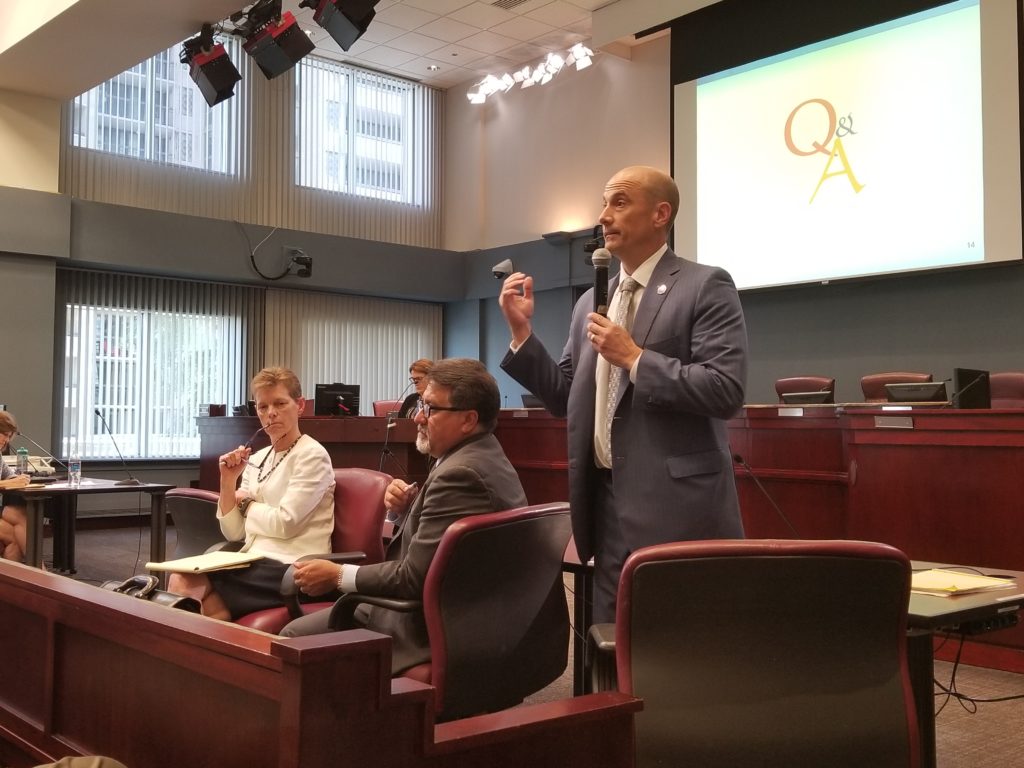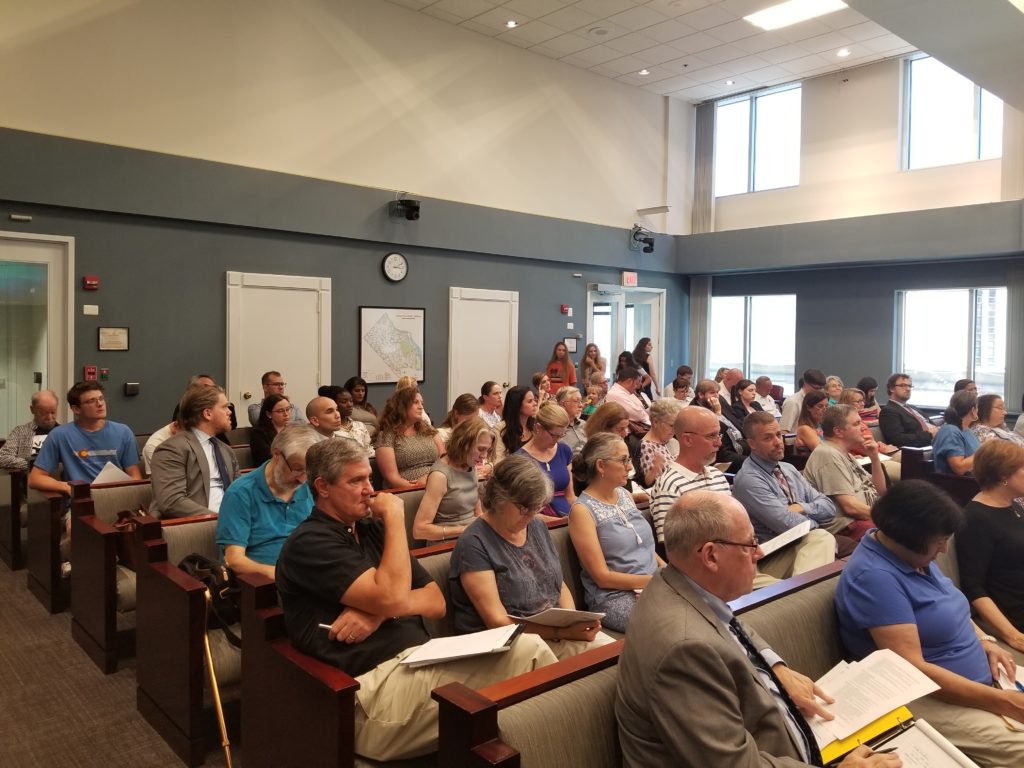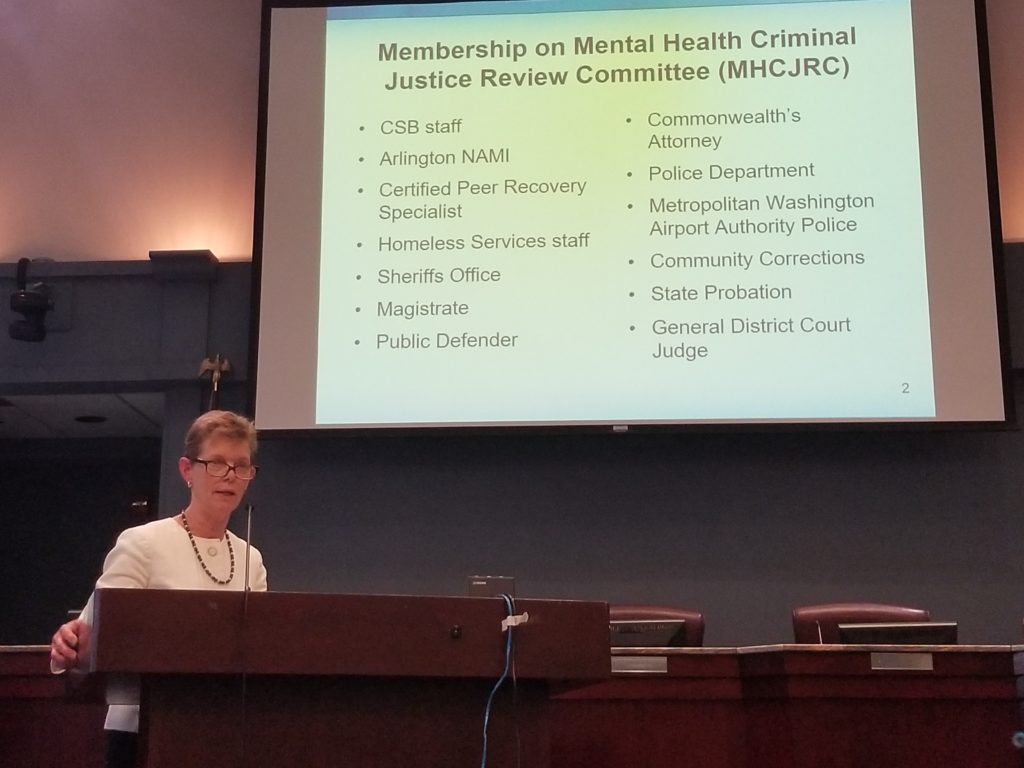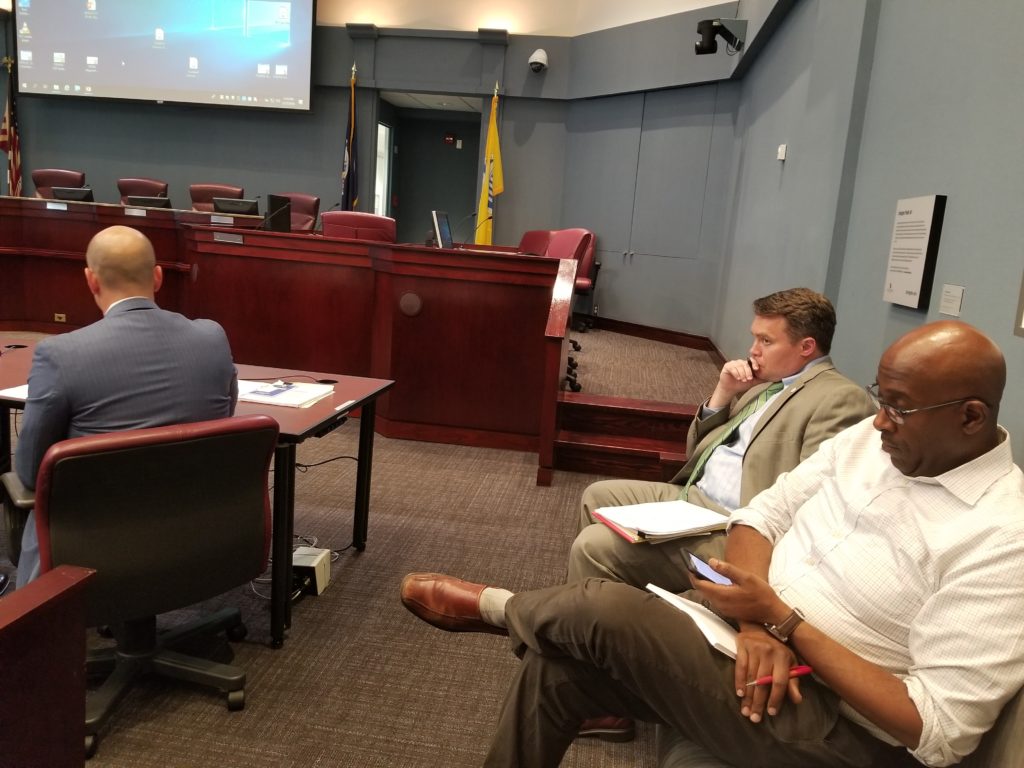Some officials and residents are asking for more time to review a jail diversion program for people with mental illnesses, saying the county developed it without enough public input.
About a hundred people gathered in the County Board’s meeting room Wednesday afternoon for a meeting called after activists requested a chance to weigh in on the new criminal justice program. Attendees expressed general support for the “Behavioral Health Docket” but worried about its requirement that participants plead guilty to participate, adding that the county needed to listen to more members of the public before finalizing the program.
“I think it’s important to keep in mind is that even if the application is a post-plea docket, which is what Judge [Fran] O’Brien would like to see happen, that there’s going to be evolution,” said Department of Human Services (DHS) Director Anita Friedman in an interview. “I think that even if we start post-plea we might add pre-plea later.”
“I think the important thing is not to let perfection be the enemy of good,” she said, noting that the county has revised its other diversion program, Drug Court, many times over the last few years.
The Office of the Executive Secretary of the Supreme Court of Virginia must approve the county’s request to form the diversion program. DHS originally planned to apply for that approval last month before a group of activists and officials, including incoming prosecutor Parisa Dehghani-Tafti, said they hadn’t heard about it and had concerns.
After the meeting, officials did not confirm whether they would extend their plan to submit the application in September, or would schedule additional public meetings.
Chief Public Defender Brad Haywood was one of the officials who said he hadn’t heard about the application until very recently. On Wednesday, Haywood said he still supported for the docket but reiterated concerns about the post-plea condition.
“I really want to make sure that as many people as possible are getting into this program, and getting in as quickly as possible,” he said, adding that requiring pleas could “dramatically reduce” the number of participants and how fast they can join it.
The Behavioral Health Docket will accept participants who have pled guilty to a misdemeanor offense, or a felony reduced to a misdemeanor, and reside in Arlington, according to a program description obtained via a Freedom of Information Act (FOIA) request. People with a history of felony convictions, sexual offenses, or have active warrants out for their arrest in other jurisdictions cannot participate, per a copy of the application ARLnow obtained after filing a FOIA request.
Participants would have to meet weekly in court as well as their probation officer, mental health clinician, per the application. Participants will also have to pass drug and alcohol screenings, take any medications prescribed, participate in activities like volunteer work or employment, and stay clear of any new arrests. Over time, participants will meet less frequently as they work towards a “graduation” where they’ll be supervised for another 90 days.
“That’s why it’s called a therapeutic docket,” said Judge O’Brien. “It’s designed to help people with mental illness and designed to help keep them on a path that keeps them out of the criminal justice system.”
She told the audience that it was imperative to move quickly because of the sheer number of people affected. Earlier that day, she said five people on her docket were clients of the county’s behavioral health services and where “chronic violators” of their parole. Recently, she said one defendant disappeared after appearing to get better and family members were concerned he was off his medications.
“All I wanted to do is try to find him before he got too far gone,” said O’Brien. “Because I didn’t have that power because he wasn’t on my docket, so I had to issue a warrant for his arrest.”
DHS held the hour-long meeting in the County Board’s hearing room after advocates criticized the department for scheduling during the workday and originally picking a Courthouse location which forbids cellphones and laptops.
District Court Judge Jason Rucker answered some questions about the post-plea requirement, saying participants usually waive some kind of rights in similar programs such as the one in Fairfax County.
“I would simply encourage people to read their program, read their application,” he said.
One Arlington resident replied that she “barely had time to study this issue,” nevermind research other jurisdictions.
Another woman asked what Falls Church residents could expect from the program and its Arlington residency requirement. (Arlington’s local courts also serve the City of Falls Church.)
One member of the public attending was Planning Commission staffer Daniel Weir, who attended in his personal capacity and asked whether a post-plea docket also made defendants vulnerable to being detained by Immigration and Customs Enforcement (ICE.)
“If we’re going to have a post-plea docket we’re going to have to look ourselves in the mirror and be willing to accept the collateral consequences that we’re exposing people to go through this program,” he said, referring to the recent threat of ICE raids in the area.
Several people asked for a second public meeting, including state Sen. Barbara Favola.
“Maybe we should do one in the evening as well,” she said. “That might be good.”
“I realize this wasn’t the best time necessary to have it, but I was working around all kinds of people’s schedules,” Friedman said of the afternoon meeting, adding it’s “very possible” they could schedule a second meeting.
In the meantime, Friedman said people can submit comments to her executive assistant Kelly Mauller at [email protected], who will forward them to the Behavioral Health Docket Committee which created the docket, along with Judge O’Brien.
The afternoon meeting in the County Board room was attended by many prominent local officials, including: Sheriff Beth Arthur, Arlington County Board Chair Christian Dorsey, Board member Matt de Ferranti, County Manager Mark Schwartz, School Board member Nancy van Doren, Clerk of the Circuit Court Paul Ferguson, outgoing prosecutor Theo Stamos, and new District Court Judge Daniel T. Lopez.
Friedman told ARLnow in an interview that the public could attend a meeting — held later that same night — with the Community Services Board (CSB) which oversees some DHS operations.
No members of the public attended the late-night meeting in the basement of the DHS building at 2100 Washington Blvd. CSB members unanimously passed a resolution during asking the county add a CSB member to the Behavioral Health Docket Committee which designed the docket, and which currently does not meet publicly or allow Arlington residents to join.
“I truly believe that everything will be read vey carefully and ideas will be considered,” said CSB Chair Jenette O’Keefe. “Obviously we don’t know the outcome of this, but we will be watching it very closely.”





